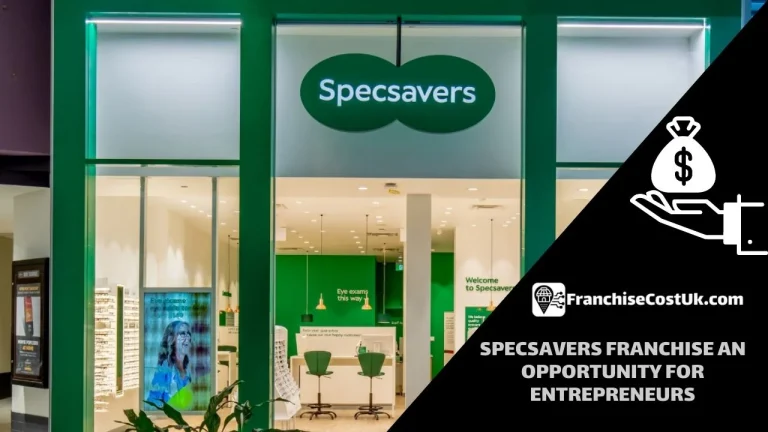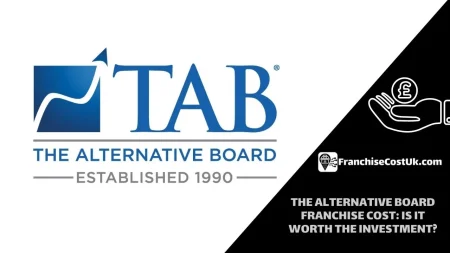Unlock Your Future: Discover 2024's Top Franchise Ventures!
Business Franchise
AA Driving instructor Franchise Cost: Becoming a driving instructor is a great opportunity for those who are passionate about helping others learn a life skill and enjoy being on the…
TRAVEL & LEISURE FRANCHISES
Food Franchises
Coffee Franchises
Costa Franchise Cost UK: Welcome to Costa Franchise UK! We are the leading provider of coffee franchises in the UK, offering…
Children's Franchises
Retail Franchises
Health & Beauty Franchises
Specsavers Franchise Cost: Starting a business can be a daunting task, but with a franchise, you can benefit from the support…
Cleaning Franchises
B2B Franchises
Are you considering taking the leap into the world of franchise opportunities in the UK? With a multitude of options available, it’s important to carefully evaluate the profitability, legal requirements, and support provided by franchisors before making a decision. In this blog post, we will explore the key factors to consider when choosing a franchise, including navigating legal and regulatory requirements, and the support and training provided by franchisors. Additionally, we’ll highlight success stories of UK franchisees who have made significant profits, providing inspiration and insight into the potential of franchise opportunities in the UK.
Understanding Franchise Opportunities In The Uk
Understanding Franchise Opportunities in the UK
Franchising has become increasingly popular in the United Kingdom, offering aspiring entrepreneurs an exciting avenue to start their own business. But what exactly are franchise opportunities and how do they work? In simple terms, a franchise is a legal and commercial relationship between the owner of a trademark, brand, or trade name (the franchisor) and an individual or group (the franchisee) who is authorized to operate a business using the franchisor’s recognized brand and business model.
Franchises provide a unique opportunity for individuals who are looking for a proven business model, established brand recognition, and ongoing support from the franchisor. By investing in a franchise, you are essentially buying into a tried-and-tested concept, which can significantly increase your chances of success. Franchise opportunities in the UK span across various industries, including food and beverage, retail, fitness, home services, and many more.
When evaluating franchise options, it is crucial to consider several key factors. Firstly, research the demand for the product or service in your chosen location. Understanding the local market and identifying gaps or potential growth areas will give you a competitive advantage. Additionally, consider the financial aspects, such as the initial investment required, ongoing royalty or franchise fees, and estimated profitability. It’s important to calculate whether the potential return on investment justifies the capital you need to invest.
- Franchise Opportunities UK: The UK offers a wide range of franchise opportunities in various industries.
- Proven Business Model: Franchises provide access to a tried-and-tested concept, minimizing the risks associated with starting a new business from scratch.
- Established Brand Recognition: By joining a franchise, you benefit from the existing brand awareness and customer loyalty.
| Advantages of Franchising | Disadvantages of Franchising |
|---|---|
| Access to ongoing support and training from the franchisor. | Franchise fees and royalties reduce overall profitability. |
| Lower risk of failure compared to starting an independent business. | Limited control over business decisions and operations. |
| Opportunity to leverage an established brand and reputation. | Restrictions on creativity and flexibility in running the business. |
As with any business venture, it is essential to thoroughly research and evaluate franchise options before making a decision. Seek professional advice, attend franchise exhibitions, and speak with existing franchisees to gain insights into the particular opportunity you are interested in.
In conclusion, understanding franchise opportunities in the UK entails grasping the concept of franchising, assessing key factors when choosing a franchise, and being aware of the pros and cons associated with this business model. By carefully considering these aspects and conducting detailed research, you can embark on a franchise journey that aligns with your goals, skills, and interests.
Evaluating Profitability Of Franchise Options
When considering starting a franchise, one of the most important factors to evaluate is the potential profitability of the franchise options available. It’s crucial to assess the financial aspects of the franchise opportunities in order to make an informed decision about which one is the best fit for your goals and aspirations.
There are several key factors to consider when evaluating the profitability of franchise options. Firstly, you need to analyze the initial investment required to start the franchise. This includes the franchise fee, any equipment or inventory costs, and the cost of setting up the business premises. By comparing the initial investment to the potential return on investment, you can determine the profitability of the franchise.
Another factor to consider is the recurring costs associated with operating the franchise. These may include royalties, marketing fees, and ongoing training expenses. Subtracting these costs from the potential revenue generated by the franchise can give you a clearer picture of its profitability over the long term.
Furthermore, it’s essential to research the market demand for the products or services offered by the franchise. Assessing the target market’s size, demographics, and trends can help you determine the potential for sales and growth. Understanding the competition in the market is also crucial in evaluating the profitability of the franchise options. Identifying how the franchise differentiates itself from competitors and whether there is a niche or demand that can be capitalized on is key.
In order to evaluate the profitability of franchise options, it can be helpful to gather data and financial projections from the franchisor. This information can provide insights into the historical performance of the franchise and give you a better understanding of its potential profitability. Additionally, speaking with current franchisees can offer valuable insights into their experiences and financial success.
Ultimately, evaluating the profitability of franchise options requires careful consideration of various factors. By thoroughly researching and assessing the financial aspects, market demand, and competition, you can make an informed decision about which franchise offers the best potential for profitability. Remember, profitability is not solely determined by the brand or concept, but also by your commitment, hard work, and ability to effectively manage the business.
| Evaluating | Profitability | Franchise Options |
|---|---|---|
| Assessing | Market Demand | Competition |
| Researching | Financial Projections | Franchisor |
| Speaking with | Current Franchisees | Decision Making |
- Franchise Opportunities UK
- Key Factors To Consider When Choosing A Franchise
Key Factors To Consider When Choosing A Franchise
When considering a franchise opportunity, there are several key factors that should be carefully evaluated before making a decision. These factors will greatly influence the success and profitability of the chosen franchise.
Market Potential: It is essential to assess the market potential of the franchise. Research the target audience, competition, and demand for the product or service offered by the franchise. Analyze market trends and potential growth to determine if there is a sustainable market for the franchise in the long run.
Financial Investment: Consider the financial aspects of the franchise opportunity. Determine the initial investment required, including franchise fees, equipment costs, and working capital. Additionally, evaluate the ongoing expenses such as royalties or percentage of sales. It is crucial to ensure that the financial requirements align with your budget and ability to secure financing if necessary.
Support and Training: Be sure to assess the support and training provided by the franchisor. A reputable franchisor should offer comprehensive training programs to help you understand the operational aspects of the business. Additionally, they should provide ongoing support and assistance to franchisees, including marketing and operational guidance.
| Key Factors | Considerations |
|---|---|
| Market Potential | Evaluate target audience, competition, and growth potential. |
| Financial Investment | Analyze initial investment, ongoing expenses, and financial feasibility. |
| Support and Training | Assess the level of support and training provided by the franchisor. |
Navigating Legal And Regulatory Requirements For Franchises

Franchising is a popular business model in the UK, offering individuals the opportunity to start their own business with the support and guidance of an established brand. However, before diving into the world of franchising, it is crucial to understand and navigate the legal and regulatory requirements that come with this business model.
One of the first steps in exploring franchise opportunities in the UK is to conduct thorough research and due diligence to ensure compliance with legal regulations. This includes understanding the legal framework for franchising, such as the British Franchise Association (BFA) and other industry regulations. The BFA is a self-regulatory body that promotes ethical franchising practices and sets certain standards for franchisors and franchisees.
Another important aspect of navigating the legal and regulatory requirements for franchises is reviewing and understanding the franchise agreement. This legal document outlines the rights, obligations, and responsibilities of both the franchisor and the franchisee. It is crucial to review this agreement with the assistance of a legal professional to ensure clarity and fair terms.
- Key considerations within the franchise agreement may include the duration and renewal terms of the franchise, the territory and exclusivity rights, the fees and royalties, and the termination and transfer provisions. A thorough understanding of these terms is essential to make an informed decision about the franchise opportunity.
- In addition to the franchise agreement, franchisors may also provide franchise disclosure documents (FDD) to potential franchisees. These documents provide detailed information about the franchisor’s financial health, history, and other relevant details. It is important to carefully review and analyze the FDD before making any commitments.
- Furthermore, navigating the legal and regulatory requirements for franchises also involves understanding and complying with employment law, health and safety regulations, and consumer protection laws. These laws are in place to protect employees, customers, and the general public, and failure to comply with them can result in serious legal consequences and reputational damage.
Table: Important Legal and Regulatory Considerations for Franchises
| Legal and Regulatory Considerations | Description |
|---|---|
| Franchise Agreement | The legally binding contract between the franchisor and the franchisee that outlines the terms and conditions of the franchise relationship. |
| Franchise Disclosure Documents | Detailed documents provided by the franchisor to potential franchisees, containing information about the franchisor’s background, financials, and other relevant details. |
| Employment Law | Legislation defining the rights and responsibilities of employers and employees, including matters related to wages, working hours, discrimination, and termination. |
| Health and Safety Regulations | Rules and guidelines aimed at ensuring safe working conditions and practices, protecting employees, customers, and the general public. |
| Consumer Protection Laws | Legislation designed to safeguard consumers against unfair business practices and ensure the provision of safe and reliable products and services. |
In conclusion, understanding and navigating the legal and regulatory requirements for franchises is vital for individuals considering franchise opportunities in the UK. Conducting thorough research, reviewing franchise agreements and disclosure documents, and complying with relevant laws and regulations are key steps to ensure a successful and compliant franchising journey.
Support And Training Provided By Franchisors
Support and training are key factors to consider when exploring franchise opportunities in the UK. Franchisors play a crucial role in assisting franchisees to establish and grow their businesses. The level of support and training provided can vary from one franchisor to another, and it is essential for potential franchisees to thoroughly evaluate these aspects before making a decision.
Firstly, let’s talk about the support offered by franchisors. Many franchisors provide ongoing support to their franchisees in various forms. This support can include assistance with site selection, lease negotiation, and store setup. Franchisors may also offer marketing and advertising support, helping franchisees to promote their businesses through national campaigns or local initiatives. Additionally, franchisors often have established supply chains and can offer valuable guidance in sourcing products or services.
Secondly, training is a crucial component of any franchise opportunity. Franchisors typically provide initial training to new franchisees, ensuring they have the necessary knowledge and skills to operate the business successfully. This training may cover areas such as the franchise’s business model, operations, sales techniques, and customer service. Ongoing training opportunities are also common, allowing franchisees to continually improve their skills and stay updated with industry trends and best practices.
- Franchisees can benefit greatly from the support and training offered by franchisors. Strong support systems can help franchisees navigate challenges and minimize potential pitfalls. By leveraging the expertise and resources of the franchisor, franchisees can focus on growing their business rather than reinventing the wheel.
- The level and quality of support and training provided can significantly impact the success and profitability of a franchise. It is essential for prospective franchisees to thoroughly evaluate the support and training programs offered by different franchisors. This evaluation should include speaking with existing franchisees, attending discovery days or seminars, and reviewing the franchisor’s track record and reputation.
- In addition to support and training, other factors to consider when choosing a franchise include the initial investment required, the franchisor’s royalty and fee structures, and the market potential for the product or service being offered. By carefully evaluating these factors and aligning them with your personal goals and aspirations, you can make an informed decision and set yourself up for success in the world of franchising.
| Benefits of Support and Training from Franchisors |
|---|
| 1. Guidance in site selection, lease negotiation, and store setup. |
| 2. Marketing and advertising support to promote the business. |
| 3. Access to established supply chains and sourcing assistance. |
| 4. Initial training on the franchise’s business model and operations. |
| 5. Ongoing training opportunities to enhance skills and stay updated. |
Success Stories: Uk Franchisees Making Big Profits

Success Stories: UK Franchisees Making Big Profits
Franchising has become a popular business model in the UK, offering individuals the opportunity to start their own businesses with the support of an established brand. Many franchisees have managed to achieve remarkable success and make significant profits. These success stories serve as inspiration to aspiring entrepreneurs looking to take advantage of franchise opportunities in the UK.
One example of a successful UK franchisee is John Smith, who invested in a popular fast-food franchise. With the support and training provided by the franchisor, John was able to quickly establish his business and attract a loyal customer base. Within just a few years, John’s franchise outlet became one of the highest-grossing locations in the entire franchise network. His dedication to providing excellent customer service and his commitment to maintaining the brand’s standards contributed to his remarkable success.
Another inspiring success story is that of Sarah Davis, who decided to pursue a home-based franchise opportunity. Sarah invested in a well-known cleaning services franchise and worked hard to build a strong client base. Through effective marketing strategies and exceptional service quality, Sarah’s franchise quickly became the preferred choice for local residents and businesses. As a result, she managed to expand her operations and hire a team of employees, further increasing her profits.
Frequently Asked Questions
Question 1: What are some key factors to consider when choosing a franchise?
When choosing a franchise, it is important to consider factors such as the initial investment required, the ongoing royalties and fees, the level of support and training provided by the franchisor, the reputation and success of the franchise brand, and the market demand for the products or services offered by the franchise. Additionally, considering your own skills, interests, and goals can help you choose a franchise that aligns with your strengths and aspirations.
Question 2: What legal and regulatory requirements should be considered when starting a franchise?
Starting a franchise involves navigating various legal and regulatory requirements. It is important to understand and comply with laws related to franchising agreements, intellectual property protection, advertising and marketing, employment, and taxation. Working with a franchise lawyer or consultant can help ensure that you meet all the necessary legal obligations and protect yourself and your business.
Question 3: How can I evaluate the profitability of franchise options?
To evaluate the profitability of franchise options, you should carefully review the financial information provided by the franchisor, including the average revenue and expenses of existing franchisees. Consider factors such as the initial investment, ongoing costs, projected sales and customer demand, and the potential for growth in the market. It can also be helpful to speak with current franchisees to get a sense of their experiences and profitability.
Question 4: What support and training can I expect from franchisors?
The level of support and training provided by franchisors can vary, but many franchisors offer comprehensive training programs to help you learn the ins and outs of their business model. This may include initial training at the corporate headquarters, ongoing support and guidance, marketing and advertising assistance, and access to a network of fellow franchisees. It is important to research the specific support and training offered by each franchise before making a decision.
Question 5: Can you provide examples of successful UK franchisees making big profits?
Yes, there are numerous success stories of UK franchisees making significant profits. For example, a fitness franchise could highlight a franchisee who saw rapid growth in membership and revenue within a short period of time. Similarly, a restaurant franchise could showcase a franchisee who achieved high profitability due to the popularity of the brand and the strategic location of their establishment. Successful franchisees often attribute their profits to a combination of hard work, effective marketing, sound business strategies, and the support provided by the franchisor.
Question 6: How can I understand franchise opportunities in the UK?
You can understand franchise opportunities in the UK by conducting thorough research. This can involve exploring franchise directories, attending franchise exhibitions and seminars, reading industry publications, and reaching out to franchise consultants or brokers. Additionally, you can visit the websites of franchisors operating in the UK to learn more about their business models, investment requirements, and available territories. Gathering as much information as possible will help you make informed decisions about the franchise opportunities available to you.
Question 7: How can I improve the chances of ranking higher in Google for franchise-related searches?
To improve the chances of ranking higher in Google for franchise-related searches, you can focus on search engine optimization (SEO) strategies. This can involve conducting keyword research to identify relevant and high-volume search terms, optimizing your website content with these keywords, improving your website’s load speed and mobile responsiveness, acquiring high-quality backlinks from reputable sources, and regularly publishing fresh and informative content related to franchising on your blog or website. Additionally, utilizing paid advertising options, such as Google AdWords, can help increase your visibility in search results.








































































